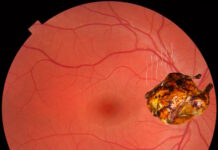
The Journal of Obvious Medicine (JOM) today published a paper showing that, as any logical person would predict, the medieval trans-vaginal hallucinogen atropine may slow myopic progression.
Researchers noted that whilst it would be obvious to even an idiot that this link would exist, the subject had not been studied until quite recently when nearly 1000 papers on the subject appeared almost simultaneously and an entire religion devoted to myopia control would appear from nowhere.
Donate to support CRONEA
For the price of one nose pad per month, you can join Team CRONEA and keep the lights on while we work tirelessly to bring humor to the otherwise sad flaccid lives of the eye care industry.
Click To Join Team CRONEA on Patreon
Lead author Professor Aradia Salem told our reporters “it has been long known that in medieval times lonely females would use atropine on the end of broomsticks inserted into their woo-hoo’s to induce hallucinations and thus “fly” through the air. So we just put two and two together and realised that it would be sensible to then give a diluted version of this powerful hallucinatory neurological agent to children in eye drop form to slow their myopic progression even without any long term neurological or psychological safety studies whatsoever. I mean, that’s pretty reasonable isn’t it?”
As this article went to print, Professor Salem had just received funding to explore whether magic mushrooms can slow the progression of astigmatism in children.







































